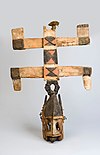| Part of a series on |
| Traditional African religions |
|---|
 |
Juju or ju-ju (French: joujou, lit. 'plaything')[1][2] is a spiritual belief system incorporating objects, such as amulets, and spells used in religious practice in West Africa[3] by the people of Nigeria, Benin, Togo, Ghana, and Cameroon.[4] The term has been applied to traditional Western African religions,[5] incorporating objects such as amulets, and spells used in spiritual practices, and blood sacrifices.[6] This is under the belief that two vessels (most commonly a monkey's head is used) that have been in close physical contact with each other have similar spiritual properties and in turn, makes the objects possible to manipulate.
In a general sense, the term "juju" can be used to refer to magical properties dealing with luck, whether good or bad.[7]
The name is also associated with the music genre, Jùjú as well as a slang term for the energy of something or someone.
- ^ "Juju | Define Juju at Dictionary.com". Dictionary.reference.com. Retrieved 2013-07-05.
- ^ Harper, Douglas. "juju". Online Etymology Dictionary.
- ^ Cbango, Ibo. "Juju". Encyclopedia Britannica. Retrieved 31 January 2022.
- ^ "Nigeria under the spell of juju". Latest Nigeria News, Nigerian Newspapers, Politics. 2020-01-13. Retrieved 2020-03-05.
- ^ Mockler-Ferryman, Augustus (1898). "Religion and Missionaries". Imperial Africa: The Rise, Progress and Future of the British Possessions in Africa. Imperial Press. p. 392.
- ^ de Cardi, C. N. (1899). "Ju-Ju Laws and Customs in the Niger Delta". The Journal of the Anthropological Institute of Great Britain and Ireland. 29 (1/2): 51–64. doi:10.2307/2842576. ISSN 0959-5295. JSTOR 2842576.
- ^ Afro-Caribbean Religions: An Introduction to Their Historical, Cultural, and Sacred Traditions. Temple University Press. 2010. ISBN 9781439901755.